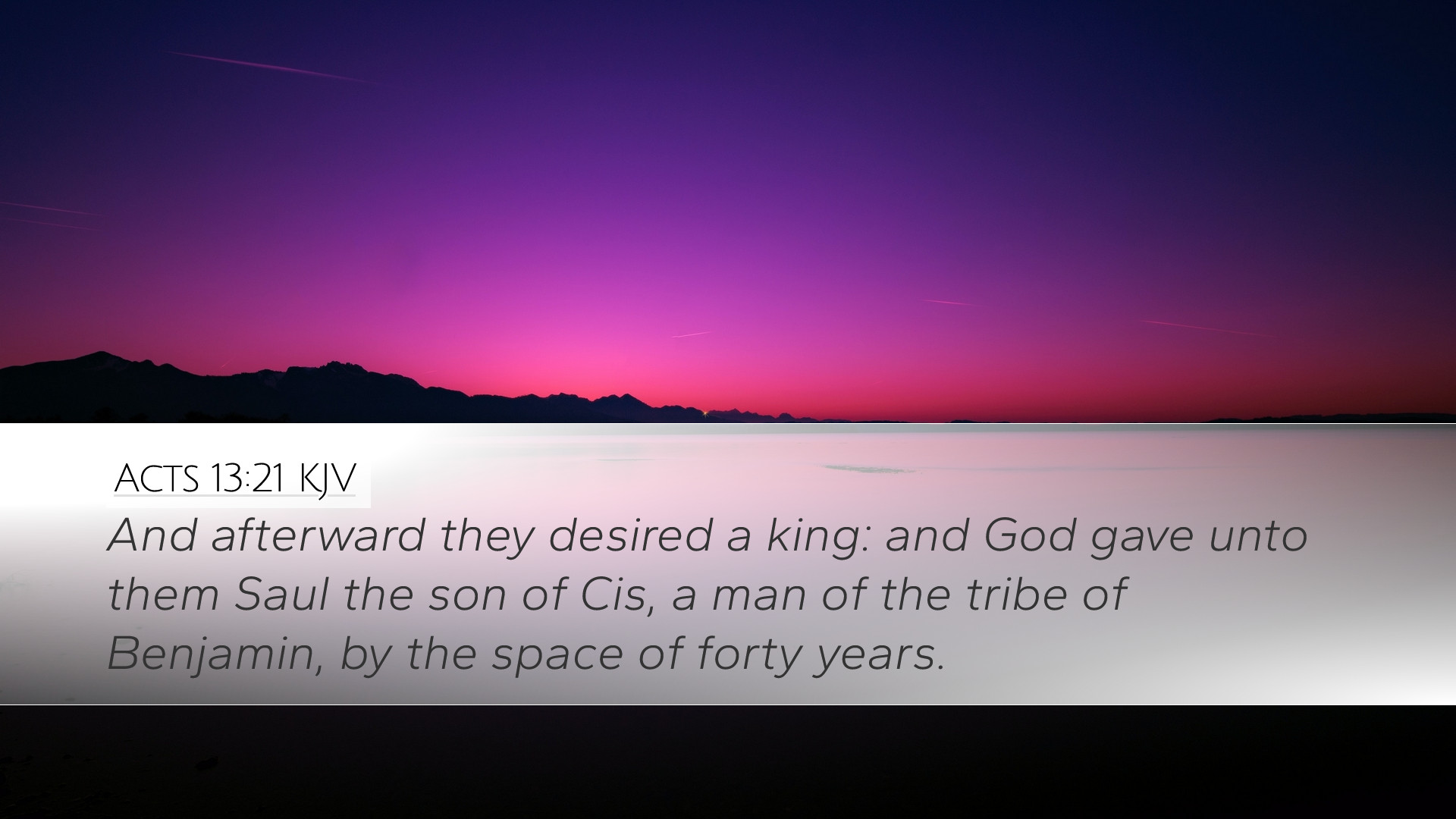Commentary on Acts 13:21
Acts 13:21 states, “And afterward they asked for a king. So God gave them Saul, the son of Kish, a man of the tribe of Benjamin, for forty years.” This verse falls within a significant historical narrative, recounting God's dealings with Israel and the implications of human leadership in contrast to divine guidance.
Contextual Overview
This verse is part of Paul's sermon in Pisidian Antioch, where he outlines the history of Israel to demonstrate God’s faithfulness and to prepare his listeners for the proclamation of Jesus as the Messiah. Verse 21 specifically highlights Israel’s demand for a king, a pivotal moment that reflects both their desire for earthly leadership and God's providential response.
Theological Themes
- The Demand for Kingship: The Israelites' request for a king indicates a rejection of God's direct rule. This demand is analyzed by various commentators, highlighting how it stemmed from their desire to be like other nations.
- Divine Sovereignty: God’s granting of Saul as a king shows His sovereignty in appointing leaders, even when the people’s desires may not align with His ultimate purposes.
- Human Leadership and its Flaws: Saul’s kingship, although initially promising, is later seen as a failure, illustrating the shortcomings of human leaders without divine guidance.
Insights from Public Domain Commentaries
Matthew Henry's Commentary
Henry emphasizes the implications of this verse by reflecting on Israel's impatience and unbelief. He notes that their cry for a king is not merely a request for a leader, but a manifestation of their deeper spiritual discontent. This highlights a crucial lesson for believers about trusting in God's provision rather than conforming to societal expectations.
Albert Barnes' Notes on the Bible
Barnes elucidates the historical context of this request, remarking that the transition from the theocracy led by judges to a monarchy was not an isolated incident. He links this to the broader narrative of God’s plans, asserting that even in their rebellion, God worked out His will, teaching that His plans often unfold in ways that include and transcend human choices.
Adam Clarke's Commentary
Clarke focuses on the character of Saul as a leader appointed by God despite the fact that the request came from a place of human desire rather than divine will. He discusses the significance of Saul’s lineage and the implications of his kingship, underscoring the complexity of divine justice and mercy. Clarke remarks on the duration of Saul's reign, affirming that God allowed it to illustrate both the purpose of human agency in leadership and the ultimate sovereignty of God over history.
Practical Applications for Today's Believers
- Trust in God's Timing: Just as Israel struggled with patience, believers today are encouraged to wait upon the Lord and seek His guidance instead of rushing into decisions that may lead to unfavorable outcomes.
- Understanding Leadership: Reflecting on the nature of leadership, both spiritual and secular, provides insights into the qualities that should characterize leaders today—namely, reliance on God and integrity of character.
- Caution Against Conformity: The desire of Israel to conform to the practices of neighboring nations serves as a cautionary tale against cultural pressures that may lead believers away from their divine calling.
Conclusion
Acts 13:21 serves as a potent reminder of the complexities of faith, leadership, and human desire. Through the lens of historical narrative, it invites pastors, students, and theologians to reflect deeply on the nature of God's governance and the choices we make as individuals and a community. The insights drawn from Matthew Henry, Albert Barnes, and Adam Clarke provide a multifaceted understanding of this pivotal moment in Israel's history, emphasizing the everlasting relevance of God's Word in guiding human actions and choices.


